
JORN – He Came To Orchestrate
Anthony Morgan
January 2013
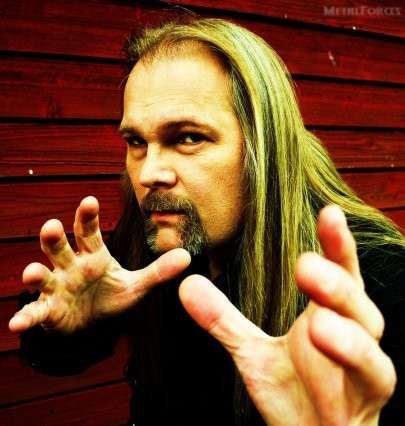
|
Authoring the composition ‘I Came To Rock’ for June 2012 studio full-length Bring Heavy Rock To The Land, Norwegian vocalist Jørn Lande felt the number would be suitable for a classical arrangement. This spawned the genesis of January 2013 endeavour Symphonic, an outing featuring a selection of pre-existing Jorn tracks culled from the solo outfit’s back catalogue, tracks remixed to accommodate a classical orchestral arrangement.
“‘I Came To Rock’ was something I thought would be cool to add some strings to, and so we tried,” Jørn remembers. “Some songs really invite you to make an orchestral arrangement. I just felt that songs like ‘I Came To Rock’ were perfect for that. Even without any keyboards or anything on the original version, it still feels like it could be something more bombastic, and that’s how I got the idea. With other tracks like ‘Behind The Clown’ (from October 2004’s Out To Every Nation) for example – which is an older Jorn track – it’s an era which was kind of a more experimental time, an era when I experimented more with various musical landscapes. That song was also a candidate. It wasn’t a typical song for a Jorn album, because it was more like a ballad. I used to enjoy the wonderful Kate Bush a lot when I grew up, which is a big contrast to the heavy rock and metal I do today or perform today.
“Yeah, the rest is history basically. It turned out great, and a friend of mine who’s very clever with arranging these things helped me out. I talked to my label and they liked the idea too, to select a few other songs. We didn’t want to do a Best Of release, because some of the songs don’t fit that well with an orchestra anyway. You could say that I wanted to bring some diversity to the album, and also to bring some of these songs to the surface. We tried to choose some of the more rare tracks, tracks that might be forgotten or are on later albums. Usually people remember the video songs, singles and stuff. So yeah, they deserve a second chance. That’s basically how it started.”
In mixing Symphonic’s tunes, each presented its own individual challenges. “We didn’t record new stuff for most of the songs,” the singer admits. “We opened the mix on some of the old songs, and tinkered around a little bit here and there. Newer songs like ‘The World I See’ we also had to open the mix on, and work more with. It had very bombastic, powerful guitars on the first original recording. We had to do some work on that one and the same with ‘I Came To Rock’, which we also had to work on to be able to fit the orchestra. In some places we had to lower the guitars, and in some places we had to turn up the volume of the guitars. We just tried to add the orchestra in the best way possible. There are some songs I think sound great, and there are other songs on the album that I think stand strong without the orchestra. Overall, I think there are some good tracks on it.
“In the big picture though, this is a heavy rock band. We’re not trying to make a symphony out of this. We’re just trying to add some flavour to the songs, and we don’t want to change them too much really. To me, it’s just an idea that came to life. It’s a good thing to have an album out these days as often as possible. We’re drowning in music these days, and the heavy rock business isn’t what it used to be in the 80s or 70s.
“It’s really important to keep the boat floating. I think this album is more or less an attempt to put something out, and to do something creative with some songs basically before the next new studio album gets released. We’re working on that at the moment, so we’re already busy with new songs. That’s the philosophy behind the album. It was basically a good idea and also a chance for me to get some songs out there again, some of the ones that many have forgotten about. A lot of the Jorn fans out there chat on the forums and the internet, and they always mention certain songs. They say ‘Oh, that song’s a treat,’ or ‘That song’s special.’ I thought to include some of those.”
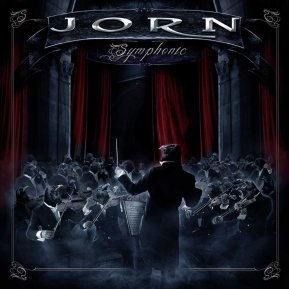
|
Of the band’s past tracks, ‘I Came To Rock’ is a particular favourite of Jørn’s. “Of the songs on the previous album, it’s definitely one of the best tracks,” he reiterates. “The title track though – ‘Bring Heavy Rock To The Land’ – I think is a great song. The title of the song doesn’t really justify the lyrical content. It’s more personal and deeper than the title suggests, and I really like that song. It has something classic to it, and with ‘I Came To Rock’ the same thing. It’s kind of like a statement, reflecting who we are. It’s about music, about life. I usually write in those terms, discussing thoughts about the past, present, and future in a visual way. I’m painting pictures, but at the same time I want to be understood. I’m not a guy who would open up a dictionary to put together something, just to try to be original. I really want to speak from the heart with what I do. It doesn’t have to be an attempt to reinvent the wheel, which isn’t possible.
“I’m basically just doing something which reflects life in general. I’m a simple man from Norway who grew up in a small town called Rjukan. It was an industrial town which saw a big shift in the beginning of the 20th century, because they built the first power plant in Norway. I think it was actually the biggest power plant when it was done in 1905. If you know the history of the Second World War, there are some great stories from those times, from events happening. Hitler wanted the heavy water, and there’s a movie about that called The Heroes Of Telemark (1965) with Kirk Douglas and Richard Harris. But yeah, it has a lot of war history; stories of how industry came about, of how electricity got to be produced in this country. I’m from a working class background. That’s basically what I have (laughs). I’ve always had to work to put food on the table, and I’m still doing that.
“I’m lucky now that all these hard years of work have paid off. I really focus 100% on music these days. It was harder in the 90s when you tried to build something, because it was almost hopeless. Nobody cared about hard rock or metal, or anything really. The best guitar players would be unemployed in the 90s. Everyone was more into Nirvana, Pearl Jam, Alice In Chains, Rage Against The Machine, but then it changed a few years later and I think it affected us as well. We experimented a lot. We didn’t want to move away from our classic roots, but we still wanted to get noticed for what we did. I guess you can hear that on some of the older, more experimental albums, that we were really trying to do something different and move into various musical landscapes. We tried new things, new combinations, trying to do things that some of the musicians of the 70s didn’t do. They usually stayed within a certain frame, and tried to maintain and keep a certain expression. Maybe they were afraid to lose their trademark, or they wanted to keep their identity to create a certain legacy or something.
“I think the result of what happened in the 90s just made guys like us more free, free to explore the musical landscape, different ones. That’s why you have albums like Ark’s Burn The Sun (March 2001) which I really feel is something diverse. I used to change my voice a lot; every song has its different character almost, almost like a chameleon. Looking back it’s both impressive and strange to listen to, because I’m far away from that form of expression these days. It’s something you develop and evolve as a musician, and as a human being somehow, you end up going back to your roots. That’s what I’m doing today, basically the classic way of singing the rock that I grew up with.”
‘I Came To Rock’’s symphonic version is reminiscent of a Broadway musical, the frontman critiques. “I love great music in general – it doesn’t matter what it is, really,” he shares. “Pop or extremely experimental music, whatever it is. If it’s good, it’s good. I don’t have any restriction; I don’t like to be constrained. The only thing I’m particular about is the performance, if you have a great arrangement and the band plays great, and the singer sings great. If you have a good song on top of that, then you have a winner. Of course it has to be something special, though. The older you get the more picky you become, especially when you’re used to the quality of 60s, 70s, and early 80s. There were some great, great artists. Some of them are still great, the ones that are still around.
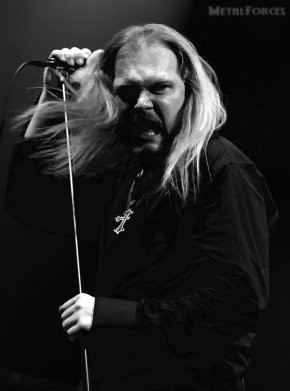
|
“As I mentioned before, Kate Bush is great, and 10cc has a great concept, great songs, and great productions. City Boy is a great band that not everybody will be familiar with. Peter Gabriel, of course. There were so many talented artists with something unique and something special, and that’s what you don’t find much these days. There aren’t many of those anymore. There are a few every now and then, but as I mentioned before, there are so many bands and so much music out there. Times move so fast that it’s really difficult for those artists to get noticed, unless you really work hard. You have to be productive.”
The record includes a cover interpretation of ‘Rock ’N’ Roll Children’, the original Dio rendition featuring on July 1985’s Sacred Heart. Jorn’s version was originally scheduled for inclusion on July 2010 full-length Dio, a tribute to late hard rock vocalist Ronnie James Dio. The frontman – whose CV included stints of varying lengths with the likes of Black Sabbath, Rainbow, Dio, Elf, and Heaven & Hell – had succumbed to stomach cancer at the age of 67 on May 16th that year. “‘Rock ’N’ Roll Children’ didn’t make it on the album at the time because I wasn’t really happy with how it turned out, with some details here and there,” Jørn confesses. “I decided not to include it on the album. Most songs on that album were recorded the year before, and some even earlier. That song was recorded in 2009. I just listened back to it again, and I thought it sounded pretty good. I then had an idea to include it on this symphonic album. If we took some of the guitars away in the beginning of the song, made a new arrangement there, and made the orchestra really audible, I thought it could be interesting to hear how it would sound. It already had some keyboards on it that sounded a bit orchestral, and I could easily hear that it could work well. It did; I think the song really ended up pretty good.
“It’s true to the original version, but at the same time it’s not trying to compete with the original version. It’s just a different version that stands on its own. That’s really great, that it sounds good and different. Sometimes when you do a cover song, you can’t really match the original. The original is always the original, and the same with a Jorn song. If somebody wants to record a song that we did then someone could really do it good, but it’s hard to match the originality of the first version. I think it’s cool that ‘Rock ’N’ Roll Children’ came out the way it did. Like I said, it doesn’t compete with the original version. It’s just a different one, a little bit more poppy than the original, because the orchestra makes it more commercial.”
The issue of tribute affair Dio was considered ill-timed in several quarters, the effort arriving a mere six weeks following the death of the album’s namesake. “It definitely wasn’t the best time to release the album, but some of the tracks on that album were from 2007 and the rest were from 2009,” the lyricist notes. “It wasn’t the best thing that happened, that the album came out so soon after Ronnie’s passing. Then again, a lot of tributes were made afterwards. I think it was obvious that many of these tributes were really done because people wanted to benefit from what had happened. I think when we evaluated the situation, since the release had already been scheduled for a long time… I spoke to my record company, and we agreed that it was better to release the album as planned rather than wait four months, and then release it. It isn’t possible to make an album like that… If you know the album, you know how it sounds and everything. It isn’t possible to have a production like that in a month, or a few weeks.
“We just thought that the effect would be better in the long run if we just released it as planned. Otherwise, it would’ve been more obvious that we went into the studio to try to benefit, or at least that’s what people would’ve thought I think. They would’ve thought that even more if we waited, and then released it four or five months later. We just thought that people would hopefully understand that it wouldn’t have been possible to do this album in just a few weeks. We just had to live with it, and see what happened. I was a big fan of Ronnie, so I didn’t want this album to be released after his passing. I would’ve loved for him to hear this album.
“The song I wrote for Ronnie – ‘Song For Ronnie James’ – was also a song that was done a long time ago. I had to go into the studio to alter a few things in the lyrics before it was released, just because it was meant to be released as a tribute to him while he was still alive. The main reason for that album to begin with was that I really had a lot of influence from Ronnie. I toured with him in 2000 when I worked with Yngwie Malmsteen for a short period. I got to know Ronnie a little bit better as a person, and I became a bigger fan of his music after that. I was also then a fan of him as a person, and that’s why I felt that album would be something for him.
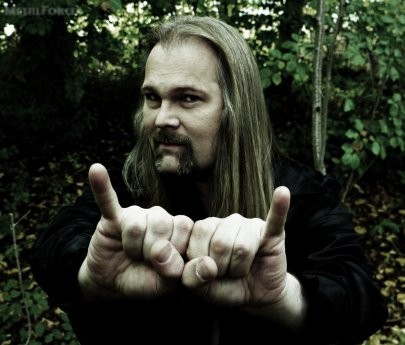
|
“I think he was a little bit in the shadows for many years. You had all these other guys since the 80s, like Ozzy (Osbourne, Black Sabbath vocalist) going off with his more commercial thing. Ronnie always stood by his sword somehow though; he stood on the barricades for what he loved to do. He just did the music that he really liked to do, and that’s what really impressed me. I guess that’s why I also plagiarised him before many other artists that I grew up with. Most of them tried to go commercial, and they changed their style with the times. I think Ronnie just did exactly what he knew was the best for him, and what he loved to do. That’s something I really respected, and made him lone in a way above the rest. I thought if someone deserves a tribute, a real tribute and if someone deserves a song, it was Ronnie James Dio. That’s why I wrote that song.”
Jørn contends that the symphonic version of ‘Burn Your Flame’ is superior to its original incarnation. “I think songs like ‘The World I See’, ‘Burn Your Flame’, and ‘I Came To Rock’ – especially these three songs, really – came out great,” he enthuses. “I think they are better than the previous versions, but not better in the sense of the songwriting or the performance. Nothing changed in those respects. It’s just that when you hear them with the orchestral arrangements, you just feel that something was added to the songs that really made them complete somehow. That’s how I feel. It’s those three that I really specifically enjoy, and of course, ‘Vision Eyes’ is another one. That one’s a really good track, an experimental track from Out To Every Nation (May 2004). ‘Vision Eyes’ really made a difference with the arrangements that we added.”
The mainman has been a fanatic of Kate Bush for a number of years. “Most people of my generation remember ‘Wuthering Heights’ (from February 1978’s The Kick Inside) of course,” he notes. “It’s elementary (laughs). When I drive in my car though, I usually have a Kate Bush CD in the car and listen to songs like ‘Cloudbusting’ (from September 1985’s Hounds Of Love). There are so many Kate Bush tracks that are astonishing. Even the poppier one ‘Babooshka’ (from September 1980’s Never For Ever) is a good one when you listen to it, but there are so many more experimental tracks that she did. I like most of it. She did a Christmas album too not too long ago (November 2011’s 50 Words For Snow), and I’ve got that one as well. I think as a rock artist I have something inside that I would love to do, and maybe one day I will work with a different concept and do something without a distorted guitar and so on. My love for Kate Bush started already in the late 70s when she did her first couple of albums, and I’ve followed her all the way up to the last one she did recently. I heard she was going on tour, but I’m not sure if that’s a rumour or not (laughs).”
Jørn’s admiration of Kate Bush caused him to pen the ballad ‘Behind The Clown’, from Out To Every Nation. “It has that mood musically, with the instruments on that song, the way it sounds, the arrangements – the whole combination,” he submits. “It’s not necessarily something that Kate Bush would’ve written, but it’s something that has that flavour. She would’ve written her own vocals on that piece of music, but I’m sure she would’ve felt comfortable in that landscape. I guess I just picked up some inspiration from her, and from Peter Gabriel as well. I have more of that style in me, I’m sure. There’s always been stuff written in the past that was never recorded. We’ll see one day. Some rock singers do something on the side; Robert Plant (Led Zeppelin vocalist) did something in the 80s, which wasn’t really that hard rocking. He also did an album with Alison Krauss a few years ago (October 2007’s Raising Sand). I guess at some point we all like to do something different. Usually we end up coming back to our roots again and do what we usually do, but I think it’s good to try something to get the confirmation that you have something inside which needs to get out. Let it loose (laughs).”
While growing up in Norway, the vocalist argues that there wasn’t such a thing as heavy metal. “In the early 70s, there weren’t really any metal bands,” he observes. “Maybe there was something called heavy metal that was similar to heavy metal. Some people say that heavy metal started with bands like Led Zeppelin, Black Sabbath, but I think that heavy metal started in the late 70s to early 80s with bands like Judas Priest and Iron Maiden. I think before that was hard rock, and experimental rock. Distorted guitars weren’t really distorted either, so that way of playing and being able to get the heavy metal sound right was one that evolved in the late 70s. Just listen to what Eddie Van Halen did with the guitar when he first started playing – his playing was something totally new. At one time the guitarist in Boston (Tom Scholz) invented something called the Rockman, which was a small, little box that made a certain sound. It was distorted; it wasn’t too thick and big, but it had this kind of crunchy, great feel and sound. I think that’s when guitarists were able to play faster, and could really do more on a technical level.
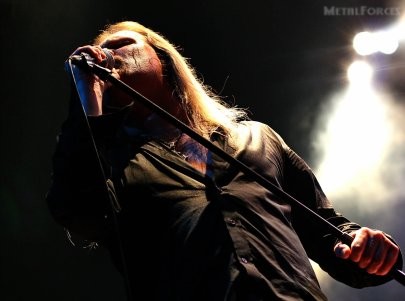
|
“I think before in the early 70s when I was a kid, nobody heard about something called heavy metal. Not even heavy rock, or hard rock. It was just rock music. Deep Purple was rock music, Uriah Heep was rock music. Nazareth, Slade, Sweet; it was all rock music. It wasn’t separated, at least where I come from. I don’t know about the UK, but people didn’t really separate the styles in the same way. It wasn’t like today with thousands of genres and subgenres, like soft metal, nu-metal, black metal, nu-black metal, thrash metal, speed metal. I don’t even know all of the names, but some of them I’ve learnt along the way (laughs). I don’t even know all of the styles that are supposed to have been invented in the last ten, 20 years. I prefer to say that even Black Sabbath was heavy rock music, but I don’t think the word ‘heavy’ was really a term that was used back then. Maybe some did, but it definitely wasn’t a common way of addressing Black Sabbath.”
All tracks cut during recording and mixing sessions for Symphonic surfaced on the eventual album. “We usually never have any leftovers,” Jørn explains. “Sometimes there might be one track, but this time no. We had three months to do everything. We had just finished the 2012 studio album, and then the album was released in June. We instantly started working on the Symphonic album. It was basically a spontaneous idea. It took three months from early July to late September or something like that, from beginning to end. There was a lot of brainstorming, but not too much time to analyse. Now I get to listen back and discover what came out great, and then I can also discover what I’m not too happy with. I think that’s how it goes these days, though. You have to deliver. Deadlines aren’t what they used to be.
“Of course, it’s what you make of it yourself. I really love to work with music all of the time, and I really like the challenge. It’s a combination of the two. It’s a form of survival, and getting to explore. It’s a challenge, basically. Can you do this? Can you make it in time? If you just brainstorm it and have to do it in a short period of time, will it turn out great or will it be something that you could live without (laughs)? I guess I’m lucky to have a record company that believes in what I do – they’re really great. Sometimes they don’t like my ideas, but very often we talk back and forth and agree to do something. I think it’s a luxury situation for an artist to be in. I’m blessed these days, and lucky to be around.”
The songwriter hopes to classically rearrange additional catalogue numbers in future. “I would love to do it with several songs, actually,” he discloses. “It’s all about having the time to do it, and you always have the pressure from the music business to deliver things faster these days. It isn’t like the old days where a band or artist could wait five years between every album, and analyse everything to make it perfect. I think we have to brainstorm a little harder today. I’m not that young, but I still came at a time when rock music was disappearing a little bit from the scene. Grunge music appeared in the early 90s, and that’s when I started building my career. It was really difficult to break through, to get noticed and recognised. It wasn’t easy, so you had to be creative and you had to be inventive with everything. I guess that’s the philosophy behind everything still.
“It isn’t getting easier, even for the older bands. Some of them can rest on their laurels, but most of us have to work hard to maintain a career. I would love to do this again, but I would love to spend more time analysing details. Maybe re-recording some stuff, and not adding stuff to pre-existing recordings. To actually work with a real symphony orchestra would be a great thing to do; it’s a dream for most artists to do that. Not many get to do it, at least not with a big orchestra, like the London Symphony Orchestra or the one official big one we have here in Norway. Usually, it’s all about budgets. It’s a big expense, and most bands don’t have the chance to do that. The ones that do are really lucky. Maybe I will do that one day if circumstances want it to happen, but definitely there are many tracks to choose from.
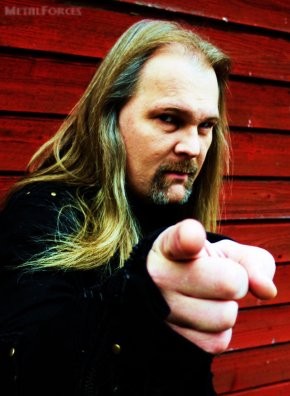
|
“It’s been so many years now making music and recording, both the Jorn music and then with other bands and projects. It’s a bit endless. There’s so much to choose from, and of course rock music was always great for classical arrangements. Combining rock with a symphony was always something that was very popular to do. If you listen to old albums from the 70s, the base of some of the songwriting back then was around classical music. If you listen to Deep Purple, or American bands like Kansas… Alice Cooper even used a lot of that stuff on some of his best albums.
“I think people today have to work faster, and the internet has made it so that the download issue came about and changed the whole music business. Albums don’t sell the same way anymore, and they don’t know how to make money from the downloading industry yet. There are still a lot of nuts to crack, in a way. Of course, now everyone can make an album. That’s also a problem, because then all the people that wouldn’t even get a record deal 30 years ago can now make albums, and use technology as a substitute due to their lack of talent. That’s also a problem.
“Everyone that wants to make a living from music can’t really always afford to pour their money into big productions, or professional music videos, a great looking website, marketing campaigns, and working with bigger companies. The good ones today are usually the ones who really struggle the most. Artists have steady jobs; one guy’s a plumber or a web designer, but he plays drums in a heavy metal band. These guys are usually independent somehow, so they can actually put everything they make from the band back into the band. I think that’s what we’ve seen in the last few years, but there are so many hyped bands out there.
“It looks like they’re really popular and stuff, but the fact is that many of them aren’t really that massive and don’t have the biggest success. It looks like they really have a big following though. It then gets a little more difficult for the real talents – the hard-working musicians – to get noticed, basically. I think that’s also why you have to work today. I’m lucky because I started a little bit earlier, so I don’t have to think in the same way. I have to work to keep the flow though, and keep the machinery working still. You haven’t seen the last of me yet (laughs).”
It was revealed on July 12th, 2012 that guitarist Tore Moren and bassist Nic Angileri had parted ways with the Jorn band. “Tore always wanted to do something on his own, and there were also some discussions and conflict in the band,” the singer reveals. “We had been playing together for many, many years. I guess we just had a different view on things, on how to continue. He basically left himself, which I guess was the result of our disagreements. Nobody got fired or anything from the band; it was his own wish to leave, based on our discussions. In the last couple of years we’ve been talking about the direction of the band and how to work and how to do things, even if it was in a live touring context, or if it was how to make an album, how to write, and what to do with certain things within this band. I guess that’s why.
“When we had a new guitarist, we had a bass player living nearby where I live, a really talented one. They were good friends, and he showed up at rehearsals together with the new guitar player. In the end, we just had to find out what to do. It really worked well. I think Nic played great on the album that he did last year with us; he played great on the tours and all the shows that he did, and he’s a great guy. It’s just we felt that it would work much better in the big picture to also include a new bass player, so we sat down to talk to Nic. Yeah, of course it’s one of those things that sometimes you don’t like to do, talking to people about certain things and then telling people that it’s not gonna work anymore. I don’t like to beat around the bush; I like to be frank with these things.
“If it doesn’t work, it doesn’t work. The best solution for the band was basically to have both a new guitar player, and a new bass player. We tried it, and it was great. Also, Nic used to play slightly different. He used to be more of a technical player – he also has a jazz-oriented background. He’s a talented guy and can almost play anything, but I also felt that the direction we moved in as a band was more pure rock in a way. It demands a more straightforward way of playing bass, a more groovy player. I think the definition of a bass player – together with the drummer – needs to be really pounding and pumping, so I think it was just more suitable for the band to have a new bass player based on what we’re doing now.”
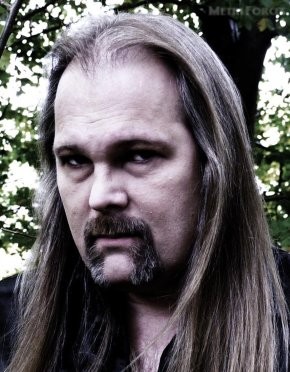
|
The new members in question are guitarist Trond Holter and bassist Bernt Jansen, both of Norwegian glam rock assortment Wig Wam. Wig Wam entered the 50th Eurovision Song Contest on May 21st at the Palace Of Sports in Kiev, Ukraine, representing their native Norway. “These guys I think are really talented, and great people,” Jørn compliments. “With Wig Wam though, they didn’t really get to play the music they loved to play. They also didn’t get recognition as musicians that they always dreamt of having. I think now they have the opportunity to get that, and to play with a band that’s not based in comedy, hair, glitter, and strange outfits (laughs).”
The frontman’s 2009 reunion with Germany-based power metal assemblage Masterplan proved to be short-lived, spawning May 2010 record Time To Be King. At the time of writing, the full-length is the third and final Masterplan studio album to feature Jørn behind the microphone. “I think the Time To Be King album was more or less meant to be not supported through touring,” he reflects. “We talked about doing shows the year after, but if something’s gonna be put back on the road then it really has to be something special. I had already established my own band, and we’ve been touring for many years now. For a band like Masterplan to get back onto the scene is just difficult. All the circumstances around the band weren’t the best, and the machinery didn’t really work as it’s supposed to. The only thing I wanted was to have decent shows and decent conditions around a potential tour and so on, but when these things don’t happen and you already have a band that’s rehearsed and promoters who want you to play, it just isn’t worth the effort sometimes if it’s not gonna make a difference. I think the offers we had to go on tour just weren’t the best, and the record company I think didn’t do what we discussed in the first place.
“Time To Be King was supposed to be a comeback album, and was meant to be a priority within the label. Certain things were supposed to be done. The music video came two to three months after the album was released (laughs). It’s not the right order, is it? It really wasn’t the best circumstances around that release, even though the album is pretty good. There are some great tracks on that one. I enjoyed doing the album, working with Roland (Grapow, guitars) again and Axel (Mackenrott, keyboards), and Jan (S. Eckert) the bass player, and Mike Terrana (drums). It was a good thing to do the album, and it was a non-complicated recording really. It wasn’t that hard to do and I really enjoyed doing it, but it was just after that that things didn’t turn out as they were supposed to do.”
The lyricist participated in touring commitments for April 2010 double ensemble The Wicked Symphony and Angel Of Babylon, the fourth and fifth studio propers by hard rock supergroup Avantasia – the brainchild of Edguy frontman Tobias Sammet. “All these guys are great guys and great personalities, a bunch of happy people together on the road – a very professional team,” Jørn evaluates. “Yeah, it was easy. It was only big shows, big stages, decent hotels, and decent food. The whole thing was really arranged on a top level. I enjoyed doing that, and my friend Bob Catley as you know probably from Magnum… I guess me and him, we were two guys who liked to sit down and have a beer (laughs), or anywhere else, and enjoy being on tour basically. I think the whole thing with Avantasia was just a very good experience, but unfortunately I’m not able to do the 2013 tour which is supposed to be a really massive tour. Because of that, I just didn’t commit to it. There are too many shows.
“It’s supposed to start in April, and end in September. There are 30 shows, maybe even more – maybe 35-40 shows. We have to finish a new Jorn album by April, and then I have to do some promotion for that album as well as play. We have a lot of shows coming up this summer with the band. I just couldn’t let the band down, so I had to say no to Avantasia unfortunately. That’s the way it goes, though. I know Bob is gonna do it, because he just told me that recently. I was just sad that I couldn’t go, because me and him go back a long time. I’ve known Bob for many years; he’s a great guy, the best.”
The vocalist will sadly not appear on Avantasia’s forthcoming record, March 2013’s The Mystery Of Time. “I was asked to participate, but I just couldn’t do it,” he laments. “Also at the time, the Avantasia camp wanted everyone who participates on the album to commit to the 2013 tour. They wanted to have the same line-up. That was the aim, the goal for the whole concept.”
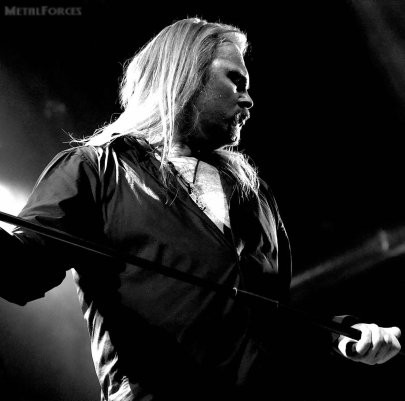
|
A fresh Jorn studio disc is in the works. “It’s less experimental than some of the earlier albums,” their namesake divulges. “I think the last couple of albums or three have been a development towards a more classic rock oriented sound, moving back to where we came from. Like I mentioned earlier, the experimentation is something which belongs in the past right now. I don’t feel that the most important thing is to try to reinvent the wheel or something, and try to discover new musical aspects of myself. I think what I need to do now is to really find the best recipe for the band. Where are we at our best? When do I perform at my best? In what type of style? Is it the simple rock music that we grew up with? I think we discovered that by not trying to go out of where we came from, and not trying to do something new… Which isn’t really possible, but I think that many bands desperately try to be original and to claim that they discovered something new.
“I just think that we want to go back to the core of things, of how we started, of why we enjoyed music in the first place, of why I started to sing. We all talked about this, so the next album is gonna be more to the point in a way. It already started with The Duke album in (April) 2006. We went even further back to our roots in a way with the Spirit Black album in (June) 2009. Lonely Are The Brave (June 2008) I forgot to mention, and with that it was the same thing. We still had some… I don’t like the word progressive, but that’s what everyone uses these days. We still had some progressive or experimental elements. They were already there, because there were some line-up changes along the way. We had a different guitar player, who used to be in a more progressive metal band from Norway. He was a technical player, but he also had some of those classic rock elements there. It was kind of like a combination, so the whole thing still came out as a kind of hybrid somehow.
“With Spirit Black though we had a new line-up, and then things really changed. It was always based on two guitarists, but now there were really two of the same calibre. I think before, I had been working with musicians that… For example, on the Out To Every Nation album. I had a drummer that was going crazy with the drums that was playing very technical and very fast. Also, for the album before that (June 2001’s Worldchanger) I worked with a black metal drummer, the drummer from Mayhem – Jan Axel ‘Hellhammer’ Blomberg. He’s also been with Dimmu Borgir. It was great and it was something different, but it just somehow slightly made it a hybrid instead of really solid. It was creative and well played and everything though, but now we have this right combination I think.
“Willy Bendiksen on the drums, he’s been with me for many years. We started playing together in the 80s, but after the 80s we went our separate ways for awhile, met one another again, and worked together for awhile. We had some arguments, and then came back together again. It’s like a marriage (laughs). Willy has been playing with me since 2006. He’s the same calibre as Cozy Powell (ex-Black Sabbath / ex-Rainbow / ex-Whitesnake / ex-Michael Schenker Group), or those kinds of drummers. Vinny Appice (ex-Black Sabbath / ex-Dio), Simon Wright (ex-Dio / ex-AC/DC), Brian Downey (Thin Lizzy). He has those qualities which not many drummers have anymore – they’re a rare and dying breed. I think what we’re doing now is coming back to the beginning.”
An album title has yet to be chosen. “We’ve just started recording some of the songs, and we have a few basic tracks that I’m writing lyrics for at the moment,” Jørn informs. “I can’t tell you any title yet. I have a few, but I’m not a 100% sure that that’s what they will be named. It’s gonna be released in June, and is gonna be a really interesting album. I’m really excited, because based on what we’ve done so far this really makes a big change. The guitarist Trond and me work really well together. We’ve seen it before with many other bands, when the singer works with the right guitarist on writing stuff. Sometimes it’s magic, but I think we’re close to something really great here. I feel very good about it. I think it’s gonna be a different album compared to the previous ones, but still you’re gonna hear that it’s a Jorn album. I think you’re gonna hear that it’s now a band who really thinks the same, a band that moves in the same direction – like a locomotive that runs on tracks.”
Symphonic was released in North America on January 22nd, 2013 and subsequently on the 25th in Europe, all via Frontiers Music Srl.
Interview published in January 2013.





